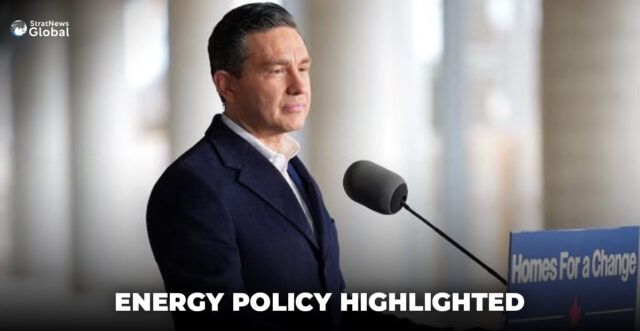A rare agreement on energy policy has taken shape in the lead-up to Canada’s April 28 election, as the two main candidates both vow to boost up energy projects aimed at diversifying oil exports away from the United States.
U.S. President Donald Trump’s tariff threats and talk of annexing Canada as the 51st state sparked a national conversation around energy supplies in the world’s No. 4 oil exporter.
Recent public opinion polls show a dramatic uptick in support for the idea of building new cross-Canada pipelines, a concept that once faced widespread opposition in some regions such as Quebec.
Canada sends 4 million barrels per day of crude oil, or about 90% of its total oil exports, to the United States. Untangling from the U.S. market will not be quick or easy.
“Our relationship with the United States has completely changed. So imports from the United States and the geography…of the pipelines is a national security problem for us,” Prime Minister Mark Carney said in the French-language debate.
Carney, whose Liberal party leads polls in the final week of campaigning, has pledged to make Canada the “world’s leading energy superpower,” forging ahead with clean energy development while also making the conventional oil and gas sector more competitive.
He has promised to accelerate the federal approvals process for major infrastructure projects to two years instead of five while also reducing emissions through support for technologies such as carbon capture and storage.
Conservative Pierre Poilievre, leader of the main opposition, has vowed to fast-track project approvals with a six-month target between application and decision. He has promised an east-west “energy corridor” with the goal of speeding up pipeline, rail and other energy-related infrastructure construction across the country.
“I’m in favor of economic sovereignty and energy sovereignty, and that requires a pipeline across Canada,” Poilievre said in the French-language debate.
Less climate-focused than Carney, Poilievre has also pledged to repeal Canada’s industrial carbon tax and allow the provinces to decide how they will price emissions from heavy polluters.
Despite political promises, no private company has expressed interest in building a multibillion-dollar east-west oil pipeline in Canada. The proposed Energy East pipeline from Alberta to New Brunswick was cancelled in 2017 due to regulatory hurdles and environmental opposition.
Gitane De Silva, former CEO of the government-run Canada Energy Regulator, said it is possible to improve federal permitting times, but provinces would also have to streamline approvals.
She said all jurisdictions across Canada need to work better together, and the industry needs to explain the benefits of their proposed projects to communities and First Nations.
Focus On Energy Projects
The renewed focus on energy is a welcome development in Alberta, which produces the bulk of the country’s oil, said Adam Legge, CEO of the Business Council of Alberta.
“I’ve not in my career seen a moment like this,” he said.
Greenpeace Canada spokesman Keith Stewart acknowledged the fresh appetite for oil and gas projects, but said candidates’ priorities should be on issues like building green homes, jobs and transportation systems for Canadians.
Former Prime Minister Justin Trudeau bought Trans Mountain, Canada’s only pipeline with access to the west coast and overseas markets, in 2018 to complete a costly expansion that has led to increased exports to Asia.
Broadly, his Liberal government was heavily focused on climate change, with policies including a proposed legislated cap on oil and gas sector emissions, which companies said would constrain their ability to grow.
Poilievre pledges to do away with the cap. Carney has said there is a role for an emissions cap but that his government will work with the oil and gas sector to advance technologies to help achieve it.
The energy sector directly and indirectly contributed 10.3% to Canada’s nominal GDP in 2023, according to federal statistics.
Martha Hall Findlay, a former Suncor Energy executive and Liberal member of parliament who heads the University of Calgary’s School of Public Policy, said she is gratified to see the main federal parties recognizing the importance of economic growth in addition to the environment.
“The frustration of the last 10 years, among primarily people in the western, oil-and-gas producing parts of the country, has been palpable,” Hall Findlay said.
(With inputs from Reuters)





